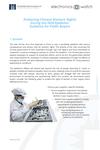Informations Covid-19 de nos partenaires de monitoring
Malaisie
En avril 2020, un ancien travailleur d'une usine d'électronique a expliqué l'impact de la pandémie sur les travailleurs migrants en Malaisie (voir la vidéo ci-dessous). Un an plus tard, la situation n'a fait qu'empirer.
Lire la mise à jour du partenaire de surveillance Tenaganita, avril 2021
(EXTRAIT) "Les travailleurs migrants sont accusés de propager la maladie ... Les réfugiés et les travailleurs migrants reconnus coupables d'un crime sont passibles de peines disproportionnées: après avoir passé du temps en prison, ils perdent leur autorisation de travailler et se retrouvent enfermés dans l'immigration centres de détention en attente d'expulsion."
Philippines
Mise à jour pour le partenaire Center for Trade Union and Human Rights (CTUHR) - Avril 2021
(EXTRAIT) "Les attaques contre les syndicalistes, les militants et les critiques se sont intensifiées pendant la pandémie. [...] Certains des ouvrier.e.s/ syndicalistes arrêtés étaient les partenaires du CTUHR et des sources d'information sur le terrain."
Pologne
Joanna Szymonek, Polish Institute for Human Rights and Business (PIHRB).
(EXTRACT) "Important is the fact that in all cases the solutions introduced by the company have been consulted with trade unions and in the case of company affected by COVID-19 crisis an official agreement was concluded for a period of 3 months and seems to balance economic and social interests."
Alfian Al-Ayubby Pelu, LIPS (Sedane Labour Resource Center)
(EXTRACT) “Some factories have been closed down, such as in Batam, one of the important electronics production hubs where 13,000 workers have been laid off. Many of these workers didn’t receive the severance pay as mandated by law. (…) Some other factories continue to operate such as in West Java province, (…) however in these factories, Covid prevention mechanisms are mostly ignored (…) A facial mask is only provided every month. (…) The working conditions are worse than before, management have failed to set a regulation to adjust to this pandemic.”
République Tchèque
Excerpts from an interview with a worker from electronics factory in Czech Republic
(EXTRACT) "The truth is that people go to work scared, because spending 11 hours with a couple of hundred other people in the hall, or even a few dozen people in the same manufacturing process that build up is a very different level of risk than 5 or 10 minutes. (...) I don't remember ever going to work thinking that I may not be there in two weeks' time. That's new for most people, I guess."
Aneesh Manjunath, Cividep India
(EXTRACT) "Another alarming development in the past few weeks has been the move to suspend various labour laws by several state governments including Uttar Pradesh, Madhya Pradesh and Gujarat, among others. This has been justified as necessary to revive industrial activity and attract more foreign investment. (...) If implemented, the changes would also allow for higher labour flexibility and a hire-and-fire policy to be adopted, along with increased working hours and overtime, third-party inspections, and simplified registration and license procedures. More significantly, existing judicial mechanisms will be rendered effectively redundant from the perspective of labour-related disputes. In the absence of essential labour laws that were already otherwise poorly implemented, workers will simply be left with no legal avenue to avail entitlements or bring up employment-related grievances."
Migrant electronics worker
(EXTRACT) "Enterprises can neither export their goods nor import raw materials for production because most materials for producing electronic components are made in China (...) so they cut off about 30-50% of orders. Therefore the workers' income falls sharply, about 50-60% of income. (...) Maintaining normal life at this time is impossible because food prices rise so high.(...) Electronics enterprises' partners need to consider the effects on workers in the whole supply chain to ensure not to cancel or suddenly reduce orders and also need to care for employees working in production facilities."
Chine
Guidance for public buyers to help protect the rights of workers in their supply chains affected by the epidemic.
Liens utiles
- Impacts of COVID-19 on supply chain workers in the electronics sector - Updates from Business & Human Rights Resource Centre
- Responsible disengagement in the time of corona - SOMO, ECCHR and PAX position paper, (20 April, 2020)
- IndustriALL Global Union's publication on the right to refuse or to shut down unsafe work (8 April, 2020)
- Covid-19 - Advice for workers and employers, IndustriALL Global Union (30 March, 2020)
- Union responses to the novel coronavirus
- Information from ITUC affiliates, Global Union Federations and LabourStart about the COVID-19 coronavirus pandemic
- China’s trade unions caught in the headlights of the coronavirus crisis, China Labour Bulletin (1 April, 2020)
- Don't forget the people behind the PPE – migrant workers meeting the surge in demand for medical gloves, The Telegraph (17 April, 2020)



